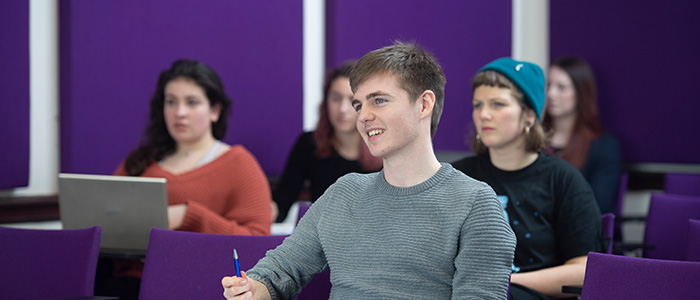Applied Photonics EngD
Our EngD is an alternative to a traditional PhD aimed at students looking for a career in industry. Students spend about 75% of time working directly with a company in addition to receiving advanced-level training from a broad portfolio of technical and business courses.
- EngD: 4-5 years full-time; 8 years part-time;
Overview
The Centre for Doctoral Training in Applied Photonics works with companies developing photonics-enabled products and services, from consumer technology and mobile computing devices to healthcare and security.
Each of our collaborations is built around an EngD or PhD student, providing them with masters-level technical and business qualifications, along with an industrially-connected doctoral research project.
- Further information from the EPSRC Centre for Doctoral Training in Applied Photonics
Study options
| full-time (years) |
part-time (years) |
|
| EngD | 4-5 | 8 |
Entry requirements
2.1 Honours degree or equivalent
Required documentation
Applicants should submit:
- Transcripts/degree certificate
- Two references
- CV
English language requirements
For applicants whose first language is not English, the University sets a minimum English Language proficiency level.
International English Language Testing System (IELTS) Academic module (not General Training)
- 6.5 with no subtests under 6.0
- Tests must have been taken within 2 years 5 months of start date. Applicants must meet the overall and subtest requirements using a single test.
Common equivalent English language qualifications accepted for entry to this programme:
TOEFL (ibt, my best or athome)
- 79; with Reading 13; Listening 12; Speaking 18;Writing 21
- Tests must have been taken within 2 years 5 months of start date. Applicants must meet the overall and subtest requirements , this includes TOEFL mybest.
Pearsons PTE Academic
- 59 with minimum 59 in all subtests
- Tests must have been taken within 2 years 5 months of start date. Applicants must meet the overall and subtest requirements using a single test.
Cambridge Proficiency in English (CPE) and Cambridge Advanced English (CAE)
- 176 overall, no subtest less than 169
- Tests must have been taken within 2 years 5 months of start date. Applicants must meet the overall and subtest requirements using a single test.
Oxford English Test
- Oxford ELLT 7
- R&L: OIDI level no less than 6 with Reading: 21-24 Listening: 15-17
- W&S: OIDI level no less than 6
Trinity College Tests
Integrated Skills in English II & III & IV: ISEII Distinction with Distinction in all sub-tests.
University of Glasgow Pre-sessional courses
Tests are accepted for 2 years following date of successful completion.
Alternatives to English Language qualification
- Degree from majority-English speaking country (as defined by the UKVI including Canada if taught in English)
- students must have studied for a minimum of 2 years at Undergraduate level, or 9 months at Master's level, and must have complete their degree in that majority-English speaking country and within the last 6 years
- Undergraduate 2+2 degree from majority-English speaking country (as defined by the UKVI including Canada if taught in English)
- students must have completed their final two years study in that majority-English speaking country and within the last 6 years
For international students, the Home Office has confirmed that the University can choose to use these tests to make its own assessment of English language ability for visa applications to degree level programmes. The University is also able to accept UKVI approved Secure English Language Tests (SELT) but we do not require a specific UKVI SELT for degree level programmes. We therefore still accept any of the English tests listed for admission to this programme.
Pre-sessional courses
The University of Glasgow accepts evidence of the required language level from the English for Academic Study Unit Pre-sessional courses. We also consider other BALEAP accredited pre-sessional courses:
Fees and funding
Fees
2024/25
- UK: £4,786
- International & EU: £30,240
Prices are based on the annual fee for full-time study. Fees for part-time study are half the full-time fee.
Irish nationals who are living in the Common Travel Area of the UK, EU nationals with settled or pre-settled status, and Internationals with Indefinite Leave to remain status can also qualify for home fee status.
Alumni discount
We offer a 20% discount to our alumni on all Postgraduate Research and full Postgraduate Taught Masters programmes. This includes University of Glasgow graduates and those who have completed Junior Year Abroad, Exchange programme or International Summer School with us. The discount is applied at registration for students who are not in receipt of another discount or scholarship funded by the University. No additional application is required.
Possible additional fees
- Re-submission by a research student £540
- Submission for a higher degree by published work £1,355
- Submission of thesis after deadline lapsed £350
- Submission by staff in receipt of staff scholarship £790
Depending on the nature of the research project, some students will be expected to pay a bench fee (also known as research support costs) to cover additional costs. The exact amount will be provided in the offer letter.
Support
We are a member of the Scottish Universities Physical Alliance (SUPA), a research alliance in physics between six Scottish Universities (Glasgow, Edinburgh, Heriot-Watt, St. Andrews, Strathclyde, West of Scotland). The SUPA graduate school gives Glasgow students access to expertise from all the SUPA institutes through the various courses.
The school has a vibrant research colloquia programme delivered by recognised experts.
You will be part of a Graduate School which provides the highest level of support to its students. The overall aim of our Graduate School is to provide a world-leading environment for students which is intellectually stimulating, encourages them to contribute to culture, society and the economy and enables them to become leaders in a global environment.
We have a diverse community of over 750 students from more than 50 countries who work in innovative and transformative disciplinary and interdisciplinary fields. An important part of our work is to bring our students together and to ensure they consider themselves an important part of the University’s academic community.
Being part of our Graduate School community will be of huge advantage to you in your studies and beyond and we offer students a number of benefits in addition to exceptional teaching and supervision, including:
- A wide-ranging and responsive research student training programme which enables you to enhance your skills and successfully complete your studies.
- Mobility scholarships of up to £4000 to enable you to undertake work in collaboration with an international partner.
- A diverse programme of activities which will ensure you feel part of the wider-research community (including our biannual science slam event).
- A residential trip for all new research students.
- The opportunity to engage with industry-partners through training, placements and events.
- Professionally accredited programmes.
- Unique Masters programmes run in collaboration with other organisations.
- State-of-the-art facilities including the James Watt Nanofabrication Centre and the Kelvin Nanocharacterisation Centre.
- Highly-rated support for international students.
Email: scieng-gradschool@glasgow.ac.uk
Collaborations
Our research groups work with a range of international collaborators and students have the opportunity to visit and work at a range of international institutes and laboratories including:
- CERN (European Laboratory for Particle Physics, Switzerland)
- Jefferson Laboratory (USA)
- Ligo lab (USA)
- ICRR (Japan).
Resources
Our in-house research facilities include:
- The Glasgow Laboratory for Advanced Detector Development (GLADD) developing the next generation of advanced sensor systems for particle physics experiments, medical applications and security systems.
- The SRDG Materials Characterisation Laboratory, developing materials for gravitational wave detectors.
- The Kelvin Nanocharacterisation Centre, researching the atomic, electric and magnetic structure of materials using one of the world's highest performance electron microscopes.
- ScotGrid, providing leading edge e-science facilities.
- The Optics group provides world-class facilities in structured light and quantum imaging.
Our research teams are also partners in many major national and international research projects including:
- The ATLAS experiment at the LHC at CERN, studying the fundamental structure of matter at unprecedented energies.
- LHCb at the LHC in CERN, studying the origin of matter-antimatter asymmetry.
- The GEO660, LIGO and Virgo Scientific Collaborations, seeking to detect gravitational waves and use these as an additional probe of major astrophysical phenomena.
- Jefferson Lab, the top nuclear physics research facility in the United States.
- The SuperSTEM facility (the EPSRC National Facility for Aberration-Corrected Scanning Transmission Electron Microscopy) running one of the highest resolution electron microscopes in the world, and accessible to scientists from all round the UK and the rest of the world.
- The award winning NASA RHESSI X-ray mission, studying solar flares and several other forthcoming international space missions such as ESA's Solar Orbiter.
- The F-CHROMA project, focusing on space-based and ground-based multi-mode, multi-wavelength study of solar flares.
Our staff and students have the opportunity to use these facilities, and PhD students are in some cases seconded to external facilities for a significant part of their research.
Graduates leave with numeracy, problem-solving skills, a capacity for logical thought and the capability to apply abstract concepts to the real world, as well as experience of working in teams. Career opportunities for physicists can be found in research in universities or in many areas of industry: high tech manufacturing, semiconductor, materials, finance, consultancy and teaching.
How to apply
Identify potential supervisors
All Postgraduate Research Students are allocated a supervisor who will act as the main source of academic support and research mentoring. You may want to identify a potential supervisor and contact them to discuss your research proposal before you apply. Please note, even if you have spoken to an academic staff member about your proposal you still need to submit an online application form.
You can find relevant academic staff members with our staff research interests search.
Gather your documents
Before applying please make sure you gather the following supporting documentation:
- Final or current degree transcripts including grades (and an official translation, if needed) – scanned copy in colour of the original document.
- Degree certificates (and an official translation, if needed): scanned copy in colour of the original document.
- Two references on headed paper and signed by the referee. One must be academic, the other can be academic or professional. References may be uploaded as part of the application form or you may enter your referees contact details on the application form. We will then email your referee and notify you when we receive the reference. We can also accept confidential references direct to rio-researchadmissions@glasgow.ac.uk, from the referee’s university or business email account.
- Research proposal, CV, samples of written work as per requirements for each subject area.
Contact us
- If you have any questions about your application before you apply: email scieng-gradschool@glasgow.ac.uk
- If you have any questions after you have submitted your application: contact our Admissions team
- Any references may be submitted by email to: rio-researchadmissions@glasgow.ac.uk
International Students
- Advice on visa, immigrations and the Academic Technology Approval Scheme (ATAS) can be found at Applying for a student visa outside the UK

Our research environment



